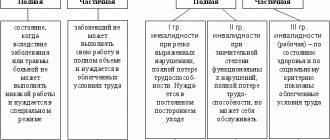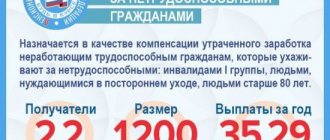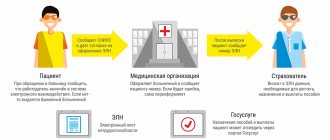As a child, we had a favorite time when we didn’t have to go to school, watch cartoons and eat jam. But we have grown up, and now sick leave is not only and not so much additional leave, but also financial losses, disapproval from the boss and long paperwork. Those who, in matters of health, still take into account the opinion of the doctor, and not the boss, formalize temporary incapacity for work due to illness. However, it turns out that not only these determined people have the right to be excused from work. So what types of temporary disability are there?
What guarantees does an employee have?
Within the framework of the norms of Article 183 of the Labor Code of the Russian Federation, during a period of temporary incapacity for work, an employee retains his position, and is also assigned a benefit payment in the amount of average earnings. However, the fact of the development of a disease is not always the basis for assigning a payment. In order to qualify for compensation, a citizen must pay monthly insurance contributions to the Social Insurance Fund.
At the same time, in accordance with the norms of Federal Law No. 255, not only citizens employed under an employment contract can apply for payment, but also:
- lawyers;
- entrepreneurs;
- state and municipal employees;
- persons recognized as unemployed, but only in a number of cases;
- citizens who issued sick leave no later than 30 days after dismissal.
Disability and its aspects
Before studying the concept of the degree and types of temporary disability, it is advisable to note that a sick person is not always incapacitated. Both social and medical criteria must be clearly defined and reflected in the outpatient card of a sick citizen. It is important to keep in mind that it is the medical criterion that serves as the leading criterion when it comes to establishing the fact of disability. However, the disease is not always considered a sign of disability. It often happens that a healthy person does not have the opportunity to carry out professional work. For example, the cook's wife fell ill with hepatitis. The specialist himself is absolutely healthy, but he does not have the right to prepare food because he has contact related to hepatitis.
Causes and signs of temporary disability
Temporary disability, unlike other types of social security, has a number of individual characteristics:
- legal justification for the inability to perform labor duties due to the occurrence of an insured event, enshrined in Article 5 of Federal Law No. 255;
- assignment of benefits as compensation for lost earnings;
- calculation of benefits in the average amount from a citizen’s earnings;
- regulated deadlines for completing the sheet, submitting it at the place of work, and paying benefits;
- sources of accruals from the Social Insurance Fund and employer funds.
Within the framework of Federal Law No. 255, an employee may be recognized as disabled for the following reasons:
- sustaining an injury or developing a disease, including complications after an abortion;
- caring for a close relative;
- stay in quarantine of an employee or a member of his family;
- prosthetics;
- Spa treatment.
What is disability
The law does not define the concept of disability, but establishes the amount of benefits and the procedure for other payments if people are temporarily or permanently disabled.
There are two forms of this concept:
- Temporary – it is characterized by the loss of work skills, which are restored over time.
- Permanent – loss of labor functions indefinitely.
Degree of conservation:
- partially: the concept assumes that a person works, but he can only perform certain functions;
- completely: a person is limited in his capabilities, he cannot perform work duties, regardless of the load.
By type of performance of labor duties, incapacity for work is divided:
- professional: means that a person cannot work only in a specific area, which, according to the conditions of work, is contraindicated for him (performing work duties in a hot shop);
- general: a person cannot perform any labor functions, which is associated with an unsatisfactory state of health, a threat to the lives of people around him, for example, in the presence of a disease of viral etiology.
Most often, employers are faced with such a form as temporary disability due to a specific disease.
Kinds
Types of temporary disability can be divided into:
- medical;
- social;
- preventive.
Each of them includes a number of insured events, determined by the norms of Article 5 of Federal Law No. 255.
Disease
A citizen is recognized as temporarily disabled due to illness in the event of loss of the opportunity to work personally due to impaired body functions or injury. By virtue of Article 5 of Federal Law No. 255, abortion and artificial insemination are also considered diseases that lead to loss of ability to work.
Accident at work and at home
Industrial and household injuries, despite similar signs of loss of ability for the worker personally, differ significantly from the standard case of the disease. By virtue of Article 228 of the Labor Code of the Russian Federation, the circumstances preceding the injury are subject to a thorough investigation.
If an illness or injury occurs at an enterprise, compensation is calculated at 100% of average earnings, regardless of length of service. Also, in pursuance of Federal Law No. 125, the company compensates for all costs of treatment, including rehabilitation, and also pays compensation.
Pregnancy, abortion and childbirth
Combining work with motherhood is one of the social guarantees provided by law. Within the framework of the norms of Federal Law No. 255, a woman has the right to issue a sick leave at 30 weeks of pregnancy for a period of 140 to 196 days in the event of a multiple pregnancy or complications arising during pregnancy. An additional guarantee for women established by Article 11 of Federal Law No. 255 is the amount of benefits, which is calculated based on 100% of average earnings for any length of service.
Quarantine announcement
Medical measures for the introduction of quarantine are carried out within the framework of the norms of Article 31 of Federal Law No. 52, only in the event of the occurrence of infectious diseases, the list of which is defined by law. At the same time, measures to limit communication in the form of quarantine are introduced if:
- the employee is a carrier, even a latent one;
- the citizen had contact with a sick person.
The need to care for a sick family member or relative
Children most of all need help and care, so parents most often issue sick leave to care for a family member just for them. Federal Law No. 255 spells out in sufficient detail both the deadlines for registering a period of incapacity for work per year and the amount of benefits depending on length of service. But Federal Law No. 255 also allows for the issuance of a certificate when an adult relative, for example, an elderly mother, is ill for up to 30 days a year.
Referral to sanatorium-resort treatment
The need for additional recovery after illness is determined only by a medical institution if there are certain indications. An employee’s desire to simply rest is not enough. In accordance with the norms defined in clause 2 of article 6 of Federal Law No. 255, the attending physician not only issues a sick leave certificate, but also a referral to a sanatorium. In this case, the treatment period cannot exceed 24 days. With tuberculosis, the length of recovery may be longer.
Adoption of foster children
By virtue of the norms of Article 257 of the Labor Code of the Russian Federation, a woman who has adopted a newborn baby is granted leave from the date the adoption decision enters into force until the child is 70 days old. At the request of the mother, this period can be replaced by leave under the BiR for the same period, followed by the issuance of a certificate of incapacity for work. If two children are placed under guardianship as twins, the certificate is issued for 110 days.
Rehabilitation after various medical procedures
Rehabilitation after surgical treatment or other medical procedures within the framework of the standards of Order of the Ministry of Health No. 279N is carried out as a type of sanatorium-resort treatment. Thus, a citizen can be sent to any sanatorium or rehabilitation center if there is a referral and an open certificate of incapacity for work for a period of no more than 24 days.
Prosthetics
The procedure for performing prosthetics and designing a sheet is regulated by the norms of Part 7, Article 6 of Federal Law No. 255. A person in need of prosthetics, upon the direction of the attending physician, enters the clinic for a preliminary consultation, selection of a prosthesis and its installation. In this case, the period of incapacity includes not only the listed activities, but also the travel time, according to the date of departure and arrival on the tickets.
Suspension from work
An employee can be suspended from performing duties only in cases specified in Article 76 of the Labor Code of the Russian Federation. In this case, regardless of whose fault the person was unable to start work, a certificate of incapacity for work is not issued. Order of the Ministry of Health and Social Development of the Russian Federation No. 624n contains an exhaustive list of grounds for issuing sick leave, in which citizens are recognized as temporarily disabled.
Types of disability
There is no concept of temporary disability in the legislation of the Russian Federation. The law establishes the types and forms of payment for sick leave, as well as benefits for specific categories, depending on the type of disability.
Kinds:
| TEMPORARY | PERSISTENT | ||
| partial | full | partial | full |
| full work activity cannot be carried out: a person requires a lighter version of work | The patient cannot perform any work; special care is required | 3 group | disability: 1st and 2nd group |
Disability groups are assigned depending on the degree of loss of ability to work, as well as to care for oneself independently. There are 3 groups:
- First: the ability to maintain oneself in proper condition is completely lost. A person depends on the help of family and friends. Unable to move independently. In some cases, disorientation in time and space may be noted. A person sometimes does not communicate with people, and also cannot control himself.
- Second: a person partially needs care, since the ability to self-care has not been completely lost. He can move, but with special devices. The ability to carry out professional activities has been lost, although certain types of work are available to a group 2 disabled person. He can look for a job and get one if his health condition allows it. If we are talking about a child, then with group 2 he may lose the ability to learn, or he may do it according to an individual program. Orientation in space and time can be carried out both independently and with the help of strangers.
- The third group differs from the previous ones in that it is a working group. A person orients himself in space, can move independently and communicate with other people. The ability to learn is preserved, but he needs a special regime and special help from teachers. People with this disability group cannot work in difficult and harmful working conditions, however, they perform a certain amount. In some cases, a person cannot quickly analyze the information received, since this requires a little more time compared to a healthy person.
Permanent disability
Permanent disability is characterized by a disorder of body functions. As a result of the disease, a person cannot completely recover from it. This circumstance is equivalent to the term disability, which is established by N181-FZ of 1995.
The causes of loss of health on a regular basis are:
- pathologies of a chronic nature;
- congenital anomalies;
- diseases transmitted by inheritance;
- consequences of injuries and injuries;
- poisonings that occurred at work.
Doctors, if there is an unfavorable prognosis for a person in relation to his professional activity, give a referral from a medical institution. A person goes to a clinic at his place of residence. He is sent to the ITU to receive the results of an examination based on the examination of his health.
After passing the commission, a person is assigned a disability. There are three groups: the first two are non-working, and in the third group a person can work. The extreme severity of the disease means that the citizen is unable to perform simple work. The first two groups are prohibited from working, but in some cases, depending on the state of a person’s health, a disabled person can apply for a job.
Temporary disability
Loss of performance occurs temporarily as a result of illness or injury. A person is temporarily disabled due to illness: as a result of medical manipulations, a person’s illness is reversible. The patient is given a sick leave certificate.
A sick leave certificate is a document intended to establish the following facts:
- official confirmation that an employee of the enterprise was absent from the workplace for valid reasons;
- payment of benefits;
- analysis of the reasons for the inability to work temporarily.
Documentation of temporary disability
Loss of ability to work does not in itself entail the assignment of benefits without documentation, as determined by the norms of Order No. 624n. If citizens apply to a medical institution for medical care, a number of mandatory documents are drawn up:
- personal card with a record of complaints, symptoms and possible diagnosis;
- referral for examination, if necessary;
- certificate of incapacity for work with the corresponding coding and other data, the list of which is determined by section 9 of Order No. 624n.
A sick leave certificate for temporary partial disability opens on the day the citizen goes to the hospital and closes on the day the treatment ends. If restoration of health involves a period exceeding 15 days, the decision to extend the certificate is made by the IHC commission. After 4 months, in case of permanent disability, the person may be assigned a disability group.
Important: In case of temporary total disability, sick leave can be extended for a maximum period of one year, but only if a complete recovery is expected.
Work ability examination
Before determining the type of temporary disability, today a work ability examination is mandatory. Its main task is to establish the ability of a particular person to perform his own professional functions, depending on social and medical criteria. In addition, it is advisable to include the following points among the tasks of a medical examination of work ability:
- Determination of the duration, degree and type of temporary disability that occurred due to an accident, illness or other reasons.
- Establishing a regime and treatment that is necessary to improve the health and recovery of a citizen.
- Recommendation of the most complete and rational use of labor of persons with limited types of working ability without compromising their health.
- Identification of permanent or long-term disability and further referral of these patients to an expert commission of a medical and social plan.
Features of registration of temporary disability
In pursuance of section 9 of Order No. 624n, the sick leave must contain a number of mandatory information. In particular, the coding on which the size of the benefit depends. After receiving the sheet in hand, it is handed over to the employer, who, in turn, according to the rules, will fill out the reverse side, entering the following data:
- experience;
- the number of working days and days off during the period of incapacity;
- total number of hours during illness;
- benefit calculation.
In this case, the sheet will not be accepted if:
- contains corrections;
- the encoding is not set;
- there are errors in the name of the company or employee data;
- the length of the period of illness exceeds the norms approved by law.
Important : For each insured event, there are maximum periods of incapacity for work in the context of a single case and an annual limit. If the deadlines are violated, the slip will not be accepted for payment.
Procedure for assigning temporary disability benefits
The procedure for applying for sickness benefits at an enterprise is quite simple and consists of just a few steps:
- submitting the sheet to the accountant;
- calculation of length of service by the HR department;
- calculation and accrual of benefits by the financial department;
- submitting an application to the Social Insurance Fund for the allocation of funds;
- payment of compensation.
Important : In compliance with the norms of Federal Law No. 255, the establishment of benefits depends on the transfer of contributions to the social insurance fund. If an employee refuses to pay them, he will be denied sick pay.
Calculation and registration of benefits on a certificate of incapacity for work
When an employee is awarded temporary disability, he usually expects to receive cash payments during the period of limitation. However, benefits are not available in all cases. For example, if an employee was given a disciplinary sanction, or if he was suspended from work due to violations or a negative decision of the certification commission, then there will be no compensation. But more often payments are still assigned. The following may be eligible for benefits:
- Employees who are on sick leave or quarantine.
- Injured employees.
- Those who have undergone surgery, including prosthetics.
- Women in connection with pregnancy.
- Relatives caring for sick family members, especially minor children.
- Those in need of sanatorium-resort treatment.
There are limits on the period of incapacity for work per employee per year. They depend on the specific circumstances of the purpose of the challenge. If the reasons are medical, they are determined by a doctor. But the amount of the benefit depends on the volume of monthly contributions, since payments are made through the insurance company. Therefore, the higher the salary, the more compensation the employee will receive.
All about violation of the sick leave regime.
Temporary disability without benefits
All cases of loss of ability to work for persons employed in official employment are documented through a sick leave certificate. But the period of health restoration is not subject to payment in all cases. So, within the framework of Article 9 of Federal Law No. 255, benefits are not assigned to:
- during periods of absence from work for legal reasons, with the exception of annual leave;
- upon suspension from work;
- upon arrest;
- during the forensic medical examination;
- during downtime.
Also, appointment will be denied if:
- the employee caused harm to himself, for example during a suicide attempt;
- suffered while committing a criminal offense.
Important : Women on maternity leave are not issued sick leave at all.
Benefit financing
Temporary disability benefits are subject to financing from the Social Insurance Fund. It must be borne in mind that unemployed people are paid appropriate benefits from their territorial employment funds.
The facts that give rise to the emergence of legal relations related to the payment of benefits include not only the immediate fact of the onset of temporary disability, but also the fact of its occurrence in the course of work. It is worth adding that sometimes benefits are paid if temporary disability that lasts more than a month, or maternity leave occurs within a month after dismissal from the workplace in accordance with valid reasons. Funds for sick people can be paid within a month after leaving military service due to conscription. This procedure is determined by Regulation No. 13-6 dated November 13, 1984 “On the procedure for providing benefits for state social insurance.”
Procedure for deprivation of temporary disability benefits
Article 8 of Federal Law No. 255 provides the grounds on which an employer can reduce the amount of benefits. In particular:
- violation of treatment regimen;
- avoidance of following doctor's orders;
- failure to appear for a scheduled examination;
- being in a state of alcoholic intoxication.
In such situations, the payment amount is reduced to the minimum wage according to the coding that reflects the violations. At the same time, it is unacceptable by law to reduce the amount of benefits based only on a sheet. In such a situation, a protocol of the social insurance commission must be drawn up, which confirms the validity of the reduction in compensation. If an employee is refused sick leave, a protocol is also drawn up.
Grounds for payment of temporary disability benefits (types of benefits)
Registration of benefits in connection with temporary inability to work is carried out on the basis of a certificate of incapacity for work, which is issued by a medical organization in the following cases:
- when caring for a family member who is sick;
- the presence of a disease in a citizen;
- introducing quarantine for a child under 7 years of age who attends kindergarten, another family member who does not have full legal capacity, or the citizen himself;
- in the process of dental prosthetics, if it is necessary to undergo inpatient treatment or another type of prosthetics;
- during follow-up treatment in sanatoriums after undergoing primary treatment.
Arbitrage practice
Controversial issues regarding payment for periods of incapacity by employers are focused on the following areas:
- dismissal during illness;
- refusal to pay during forced absence;
- deadlines for submitting and paying sick leave.
As judicial practice shows, positive and negative decisions are approximately equally divided between employees and insurers. This situation is due to the fact that ordinary workers cannot always prove their case with reason and provide documentary evidence.







